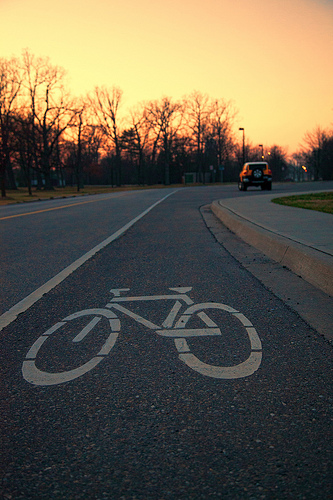Cyclist backlash against governors’ safety report

This year’s Governors Highway Safety Association report raised a firestorm among bike advocates, who felt it blamed them for bad urban design and inattentive driving on motorists’ parts. From Missi.
A recent report from the Governors Highway Safety Association is causing upheaval among cycling advocates. The GHSA, a nonprofit that represents state transit safety departments, issues regular reports about safety concerns and uses the data to advocate for stronger regulations on motorcycle helmet, distracted driving, and seatbelt use laws, Governing reports. Last week’s bike safety report, which noted a 16% jump in cyclist fatalities between 2010 and 2012 as well as helmet use and alcohol use among the killed cyclists, is now under fire.
First, more on the report: The report notes a 16% increase in cyclist deaths (from 621 in 2010 to 722 in 2012) in comparison to a 1% jump among all other forms of transportation. The bicycle data for the report was provided by the Fatality Analysis Reporting System and reported by the Insurance Institute for Highway Safety. The report recommended following the “Complete Streets” concept, which, as Smart Growth America explains, is “designed and operated to enable safe access for all users, including pedestrians, bicyclists, motorists and transit riders of all ages and abilities.”
Cycling groups took issue with the report for its focus on cyclist behavior as well as the group’s survey method, though, and they also argued against the media’s coverage of the report — such as this Los Angeles Times piece, published with a controversial photo. The GHSA’s tweets also focused on biker responsibility: “More than 2/3 of fatally injured bicyclists in 2012 were not wearing a helmet,” and “More than 1 in 4 adult bicyclists killed in 2012 were alcohol-impaired.”
Another tweet appeared to play down biker safety: “Bike fatalities are a growing problem for specific groups, but not an issue universally.” “The combination of things suggested that: Number one, if only people would wear helmets, then cycling would be safe. Number two, that, in a way, it’s a cyclists’ own fault because they’re not wearing a helmet or they’re drunk,” Rutgers University urban planning professor John Pucher told Governing.
“There is a lot of sensitivity in the bike world around safety questions, because safety is the biggest barrier to people riding bikes,” Martha Roskowski, director of the green lane project for People for Bikes, told Governing. Walkers and drivers don’t tend to worry about their forms of transport, though they do have concerns about biking; this in turn impacts all bikers, according to Roskowski, because the more bikers there are, the safer biking becomes. Plus, drivers are less likely to hit cyclists if they expect to share the road with them.
GHSA’s executive director Jonathan Adkins defended the report, saying that the fatality increase was highlighted in order to make changes to prevent more deaths. “Let’s take action now, and not just accept increased deaths as something we have no control over. Every one of those deaths is preventable. These are not just random acts that occur,” he told Governing. “We’re not willing to accept that an increased number of deaths are a cost or a trade-off to more riding.”
There are a number of arguments against the report: one is that the data on how often people bike is limited. As Governing explains, “We don’t know whether the increase in the number of fatalities from 2010 to 2012 came as more people decided to bike.” Another argument is that the two-year timeframe used in the study is too brief to form significant opinions. (“Just looking at that very, very short period is not representative. It gives the impression that cycling is getting so dangerous. Just looking over cycling over those two years is misleading,” Pucher said).
A final argument is that it requested states to pass laws requiring all bikers to don helmets. (No state has thus far passed such legislation for adult cyclists.) There’s a good reason: Head injuries are the most frequent serious injury in fatal bike crashes. Yet cycling advocates contend that a required helmet law would discourage people from biking.
Check out the report for yourself online here.
Related Posts
Category: Transportation

















